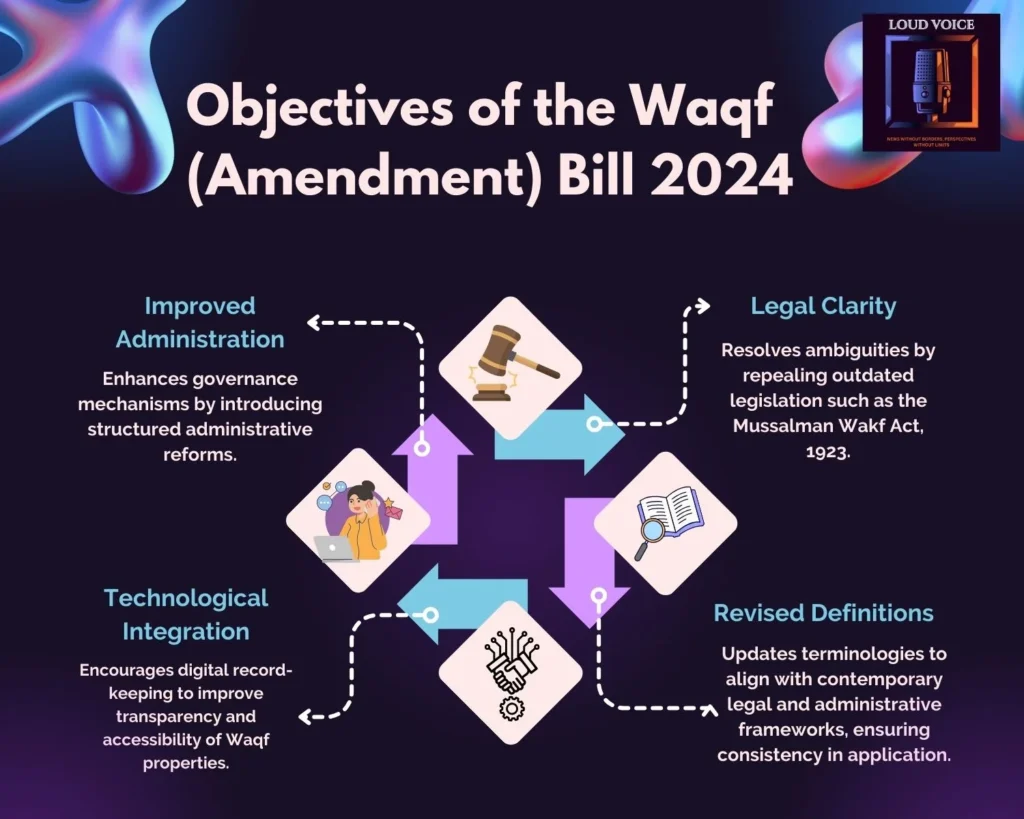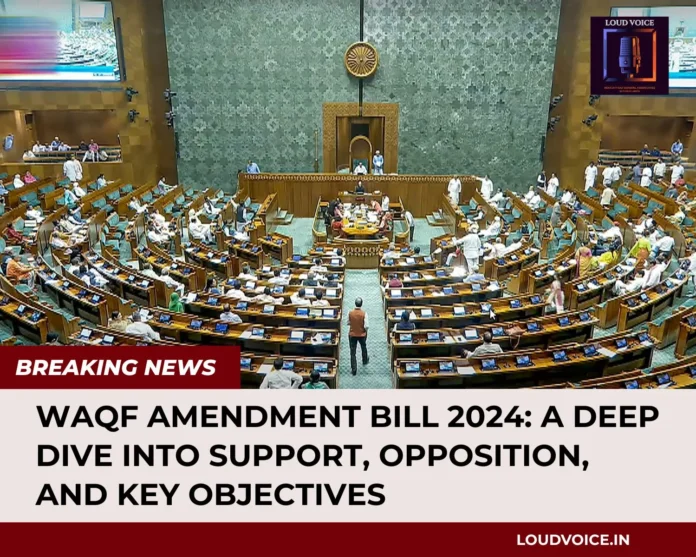Introduction
The Waqf (Amendment) Bill, 2024, has emerged as a focal point of debate in the Indian Parliament, with strong support from the ruling government and its allies, while the opposition remains steadfast in its resistance. The bill aims to reform the administration of Waqf properties, ensuring transparency and efficiency.
However, its provisions have sparked concerns among minority groups and opposition parties regarding its potential implications. This article provides an in-depth analysis of the bill, outlining the political divide, key provisions, and underlying objectives.
Supporters of the Waqf (Amendment) Bill, 2024
The ruling Bharatiya Janata Party (BJP) has championed the bill, asserting that it brings much-needed reforms to Waqf property management. Several key allies have voiced their support:
- Janata Dal (United) [JD(U)]: The party leadership has assured representatives of the Muslim Personal Law Board and Waqf Board that their concerns will be communicated to the government.
- Lok Janshakti Party (Ram Vilas) [LJP(RV)]: The party has emphasized its commitment to supporting the welfare of the Muslim community while backing the bill.
- Telugu Desam Party (TDP): TDP spokesperson Prem Kumar Jain stated that the party endorses the bill, dismissing claims that it infringes on Muslim rights.
- Shiv Sena (Eknath Shinde faction): Issued a three-line whip to its MPs, directing them to support the bill in the Lok Sabha.
The BJP-led National Democratic Alliance (NDA) has expressed confidence that it has the necessary votes for the bill’s passage in Parliament.
Opposition to the Waqf (Amendment) Bill, 2024
The INDIA bloc, comprising multiple opposition parties, has united against the bill, citing concerns over minority rights and constitutional principles. Key opposition parties include:
- Indian National Congress (INC): Leaders like Mallikarjun Kharge and Rahul Gandhi have voiced strong objections, calling the bill “unconstitutional.”
- Samajwadi Party (SP), Trinamool Congress (TMC), Nationalist Congress Party (NCP), Communist Party of India (Marxist) [CPI(M)], and others have convened strategy meetings to challenge the bill.
- Dravida Munnetra Kazhagam (DMK): Senior leaders such as TR Baalu and Kanimozhi have criticized the bill for altering the traditional governance of Waqf properties.
The opposition has argued that the bill grants excessive power to district collectors and introduces non-Muslim members into Waqf governance structures, which could potentially undermine the autonomy of Waqf institutions.
Key Provisions and Controversies
The bill introduces several amendments that have become points of contention:
- Removal of ‘Waqf by User’ Clause: The amendment eliminates this provision, which previously permitted land to be classified as Waqf due to long-term religious or charitable use. Critics fear this change could spark legal conflicts over established Waqf properties.
- Inclusion of Non-Muslim Members: The bill proposes the appointment of non-Muslim members to the Waqf Board and Central Waqf Council, raising concerns about potential conflicts in religious governance.
- Increased Authority for District Collectors: Grants district collectors greater control over Waqf land disputes and administrative decisions, reducing the autonomy of Waqf institutions.
- Streamlining Legal Frameworks: Repeals outdated laws, including the Mussalman Wakf Act, 1923, to bring clarity and modernization to Waqf regulations.
Parliamentary Dynamics and the Bill’s Prospects
Lok Sabha

In the Lok Sabha, where a simple majority of 272 votes is required for passage, the NDA holds a decisive majority:
- BJP: 240 MPs
- JD(U): 12 MPs
- TDP: 16 MPs
- LJP(RV): 5 MPs
- Rashtriya Lok Dal (RLD): 2 MPs
- Shiv Sena: 7 MPs
If the NDA remains united, the bill is expected to clear the Lok Sabha with ease.
Rajya Sabha
The Rajya Sabha presents a more complex scenario, where the bill needs 119 votes for passage. The NDA currently has 125 MPs, but securing a majority may require additional support from smaller parties and independent members.
Objectives of the Waqf Amendment Bill 2024
The government has framed the bill as a step toward modernization and better governance of Waqf properties. The key objectives include:

- Improved Administration: Enhances governance mechanisms by introducing structured administrative reforms.
- Legal Clarity: Resolves ambiguities by repealing outdated legislation such as the Mussalman Wakf Act, 1923.
- Technological Integration: Encourages digital record-keeping to improve transparency and accessibility of Waqf properties.
- Revised Definitions: Updates terminologies to align with contemporary legal and administrative frameworks, ensuring consistency in application.
Conclusion
The Waqf (Amendment) Bill, 2024, has ignited intense political and legal debates, reflecting the broader ideological divide in Indian politics. While the government argues that the bill promotes transparency and administrative efficiency, the opposition contends that it threatens minority rights and alters the traditional governance of Waqf institutions. As the bill moves through Parliament, its impact on Waqf properties and the socio-political landscape of India remains a subject of national discussion.


